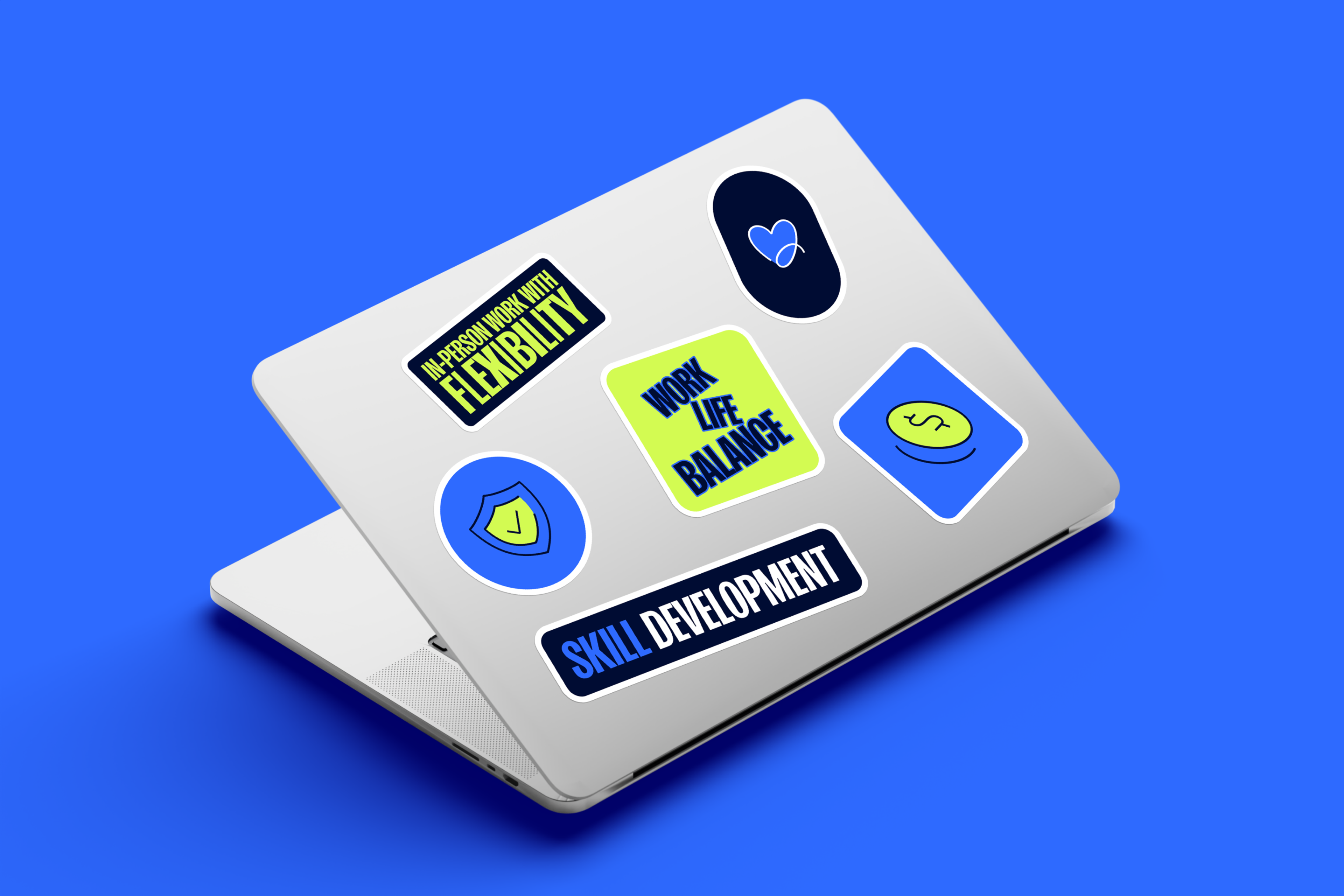Every year, a new class of grads enters the workforce. Remember what it feels like to be starting your career? Nervous, curious, excited, hopeful…it can be overwhelming. And yet, students and recent grads have some pretty clear priorities.
Handshake Network Trends regularly reveal what’s top of mind for students and recent grads today. So we’ve wrapped up the top 6 benefits, values, and preferences from early career job seekers over the past year. How will you use this information to update your early talent acquisition and retention strategies?
6 things Gen Z wants from their next job
1. Job stability and financial security
- 76% of undergrads say guaranteed hours or job security would make them more likely to apply to a job
- 22% of undergrads see student loan repayment support as an essential employer benefit, and an additional 51% say it’s important
Stability and job security are the number one thing Gen Z wants from their employer. This data supports a larger theme of Gen Z wanting to feel secure and able to plan for their future. For example, more than 80% are already thinking about retirement—and 65% say they wouldn’t take a job that didn’t offer retirement benefits.
A majority—56%—of seniors in the Class of 2024 expect to hold student loan debt upon graduation. Of those with student loan debt, 69% say their debt will influence the jobs they consider. While student loan repayment benefits are on the rise, they're still relatively uncommon. So your company can stand out by updating your benefits packages for early career employees in particular with thoughtful retirement plans and student loan support.
2. Opportunities to develop skills
- 87% of undergrads say learning and development (L&D) benefits are either important or essential when evaluating a job opportunity
- 63% of undergrads say developing advanced skills in their field is essential to their definition of career success
Early talent is looking to learn and grow well after graduation. Students are most likely to say they want L&D support focused on building specific skills for their role; 52% would find role-specific courses provided by their employer “very valuable.” Students also want employers to put money behind their commitment to L&D; 50% say tuition reimbursement is a “very valuable” L&D benefit.
In fact, Gen Z’s quest for financial security likely inspires the 75% who say employers should provide financial literacy programs. Keep that in mind for recruiting events, onboarding experiences, and your L&D program for entry level employees and beyond.
3. In-person work with plenty of flexibility
- 70% of undergrads are more likely to apply to a job that offers schedule flexibility
Given Gen Z has entered the workforce at a moment when flexible work has become an option in many professions, flexibility is a strong benefit to attract and retain early talent. More than 80% of undergrads believe that in roles where remote work is feasible, it should be an option for employees at least some of the time. And almost 90% say flexibility is an important factor when considering a job.
“I would much rather be around people, but have the option to be virtual if I would like to switch it up. The ability to be flexible and avoid stagnation is essential to me.”
—Student, Class of 2025
What is the preferred work arrangement for early career talent today? “Generally in-person with remote options” got the highest ranking from students.
4. Sustainable work-life balance
- 78% of undergrads say having a sustainable work-life balance is essential to their definition of career success
- 80% of undergrads are highly or somewhat worried about burnout once they start a professional career
Early career job seekers today are keen on benefits that help them balance work and life. For example, 72% say they wouldn’t take a job that didn’t offer paid leave and time off. Students believe they shouldn’t have to choose between work-life balance and a successful career. Fortunately, 88% of jobs posted on Handshake offer time off as a benefit. And job descriptions are trending toward mentioning mental health and employee wellbeing.
5. Values alignment
- 65% of undergrads would not apply to a job if the employer’s values didn’t align with theirs
Early talent today want to work somewhere they feel has a broader mission and purpose that aligns with their values. Almost half of undergrads (49%) say making a positive social impact is essential to their definition of career success. And more than 70% say it’s at least moderately important that their employer has committed to making a positive impact on environmental, social, and governance issues.
6. Competitive pay and salary transparency
- 72% of undergrads say a high starting salary makes them more likely to apply to a job
Starting salary—and visibility into salary bands on job descriptions—is an important factor for Gen Z job seekers. Take into account their overall emphasis on financial stability and security, their student loan burdens, and the fact that more than half of undergrads expect to support parents/family members during their career—in addition to macroeconomic influences that they’ve come of age with, from the Great Recession to the pandemic.
However, fewer than 1 in 4 early career job seekers say they definitely plan to negotiate their salary. Among those who don’t plan to negotiate, 57% of men and 65% of women are reluctant to do so because they don’t want to risk losing a job offer. Again, consider how offering financial literacy learning and development opportunities could create a more equitable job search process.
Early talent is the future of work—attracting & retaining them is critical to your success
The college-to-career transition is a big shift for every generation. With openness to what Gen Z wants in their next job, you can cultivate promising early talent and be the change they want to see at your employer. After all, it’s not the company that makes the people; it’s the people that make the company.
